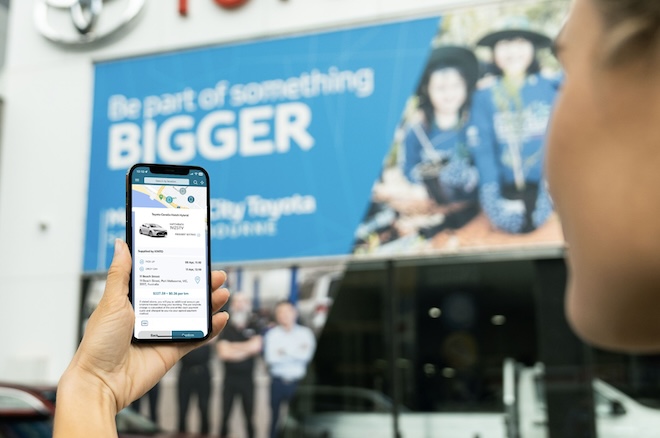For decades, car ownership has been an entrenched financial burden on Australian households. Between soaring registration costs, complex insurance and rapid depreciation, the "freedom" of owning a vehicle often feels more like a heavy commitment.
Now, a major player is fundamentally challenging this status quo: KINTO, the dedicated mobility solution from Toyota, is expanding its digital-first ecosystem, offering Australians a crucial counter-narrative to traditional vehicle finance.
The latest national expansion by KINTO, particularly in key urban centres, positions it not just as a flexible option but as a genuine form of financial and environmental disruption — a move that deserves scrutiny by any consumer concerned about the spiralling cost of living. At its core, KINTO offers multiple tiers of vehicle access: KINTO Share (hourly/daily car share), KINTO Rent (traditional car rental) and KINTO Flex (monthly subscription).

The new economic model: Unbundling the cost of the car
For many Australians, the traditional car rental model is associated with opaque fees, restrictive hours and counter queues. KINTO's approach, driven by technology, strips away this friction, addressing a core concern of the Independent Australia readership: transparency and fair pricing.
By separating the cost of access (a duration fee) from the cost of use (a per-kilometre fee), KINTO makes the total price visible and predictable. This is particularly appealing in urban environments like the inner-city hubs of Sydney and Melbourne, where car ownership is financially punishing due to parking levies and garaging expenses. The cost-benefit is clear: you pay only for the vehicle when you need it, eliminating the idle expense of ownership.
In the highly competitive environment of Melbourne car share and Sydney car share, KINTO's primary advantage is not merely convenience, but commitment. The use of the reliable Toyota fleet, predominantly hybrid models, offers an implicit promise of lower running costs and reduced environmental impact — a vital consideration for discerning consumers who value both their wallet and the planet. This focus on cleaner mobility offers a stark contrast to some peer-to-peer services that lack fleet-wide quality control and operational standards.
Digital key to financial freedom: The KINTO car hire app
The engine of this disruption is the KINTO car hire app. It represents a complete abandonment of outdated paper contracts and in-person transactions. The entire process is managed via your smartphone. This self-service model is the key to KINTO’s efficiency and cost savings, which are passed on to the consumer.
How the app enforces transparency:
- Booking and Vetting: Users sign up, are approved digitally, and can browse real-time availability and transparent pricing from their couch. The app displays all fees, including duration and distance charges, before you confirm the booking.
- Keyless Access: The KINTO car rental app functions as the vehicle's digital key. Users walk up to their booked car, unlock it via Bluetooth and start the engine using the push-button ignition. This eliminates human intermediaries and potential for upselling or last-minute charges.
- All-Inclusive Pricing: Critically for financial security, the app confirms that insurance, registration, maintenance and even fuel (via a provided card) are included in the price. The customer is only responsible for tolls and the visible duration/distance fees.
This fully digital, contactless experience is a powerful tool for consumer empowerment. It removes the opportunity for last-minute hidden fees and the time wasted in a traditional rental office, issues that have long plagued the established Australian car hire sector. It is a genuine step towards a low-friction economy, where technology enforces transparency over corporate ambiguity. This model is designed for a generation that demands immediate service and expects digital tools to simplify complex transactions.

Share and flex in metropolitan Australia
The rise of the car share model in Australia is directly linked to the country’s urban congestion and housing affordability crises. In sprawling cities, access to transport remains essential, yet owning a car is often a poor financial decision due to infrastructure bottlenecks and inflated city costs.
KINTO’s multi-pronged ecosystem is designed to be highly adaptable, providing scalable solutions for different needs:
- KINTO Share is ideal for short, spontaneous trips and errands, directly competing with the idea that one must own a vehicle for occasional, immediate needs. The increasing number of on-street pick-up and drop-off points makes KINTO as accessible as public transport, helping to ease the pressure on city streets by reducing the need for private parking.
- KINTO Flex offers the greatest challenge to traditional car finance. This monthly subscription includes all running costs and allows users to swap vehicles as their lives change. A hatchback for the weekly commute can be instantly swapped for a HiAce van for a house move, or an SUV for a regional holiday. This eliminates the financial handcuffs of long-term debt and the high transaction costs associated with buying and selling. It offers true asset mobility.
In essence, KINTO is not simply an improved rental company; it is offering a scalable utility that provides "mobility-as-a-service." For Independent Australia readers, this represents a significant shift in corporate strategy: a recognition by a major automotive manufacturer that the future of transport lies not in selling steel, but in providing flexible, digitally managed access to it. It’s a solution that addresses both the personal financial pressures and the broader infrastructural challenges facing modern Australia.
The question now is whether the established automotive and finance sectors will adapt quickly enough to this new, transparent model, or if KINTO will establish itself as the dominant force providing Australians with a genuine escape from the crushing commitments of traditional car ownership. The digital keys are in the hands of the consumers.










